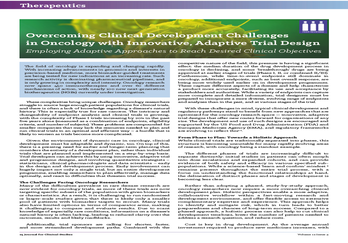Cytel Scientists Call for a “Statistician-First Workflow” to Optimize Drug Development

A new peer-reviewed article co-authored by several Cytel scientists re-examines the way in which adaptive trials are designed and implemented within the oncology space. The wide ranging paper spans numerous topics including data considerations, statistical considerations, the commercial and scientific value of flexibility in adaptive designs, and also a “Holistic Approach” to program development, wherein development plans are not created study by study, but across phases.
One of the paper’s observations is the pivotal role that statisticians can play in every phase of drug development, and the need to make quantitative strategy feature more prominently in trial design. The author's observe, "...it is difficult to know when statistical expertise is needed, and to know what is unknown or unaccounted for. If a statistician is unaware that a trial faces a particular issue, they cannot suggest a solution..."
The following are some examples of when it is valuable to seek out statistical support early one:
- Detection and Mitigation of Risks: Every trial has uncertainties that could eventually translate to commercial challenges. Statisticians can identify these risks early when given the opportunity to play a key role in strategic trial design.
- Understanding the full spectrum of opportunity: Just as every trial has unexpected risks, a good many have unseen opportunities. Often these are when conducting a ‘deep-dive’ into the statistical nuance of the context. Unfortunately, keeping statisticians from early decision-making can result in these opportunities going unnoticed.
- Navigating Adaptive Trials: Adaptive trials often have complex Statistical Analysis Plans, and ensuring statisticians are heavily involved in strategy can ensure these do not become too complex and are followed properly for regulatory submission.
- Precision Medicine: Statistical genetics for population enrichment designs often requires statisticians early on to know which populations ought to be enrolled and how a trial ought to be stratified.
- Posing the right questions: When beginning a trial, it is sometimes helpful to take into account data collected previously. When these data come from fields like outcomes research, data science or clinical pharmacology, smaller organizations might not have access to all of these specialist departments. Having a qualified statistician can help navigate the challenges of posing the right question to CROs and other partners.
To learn about the Holistic Approach to trial design, how to avoid design phase by phase, and other new methods to streamline oncology drug development, click the link below to download a complimentary paper.


